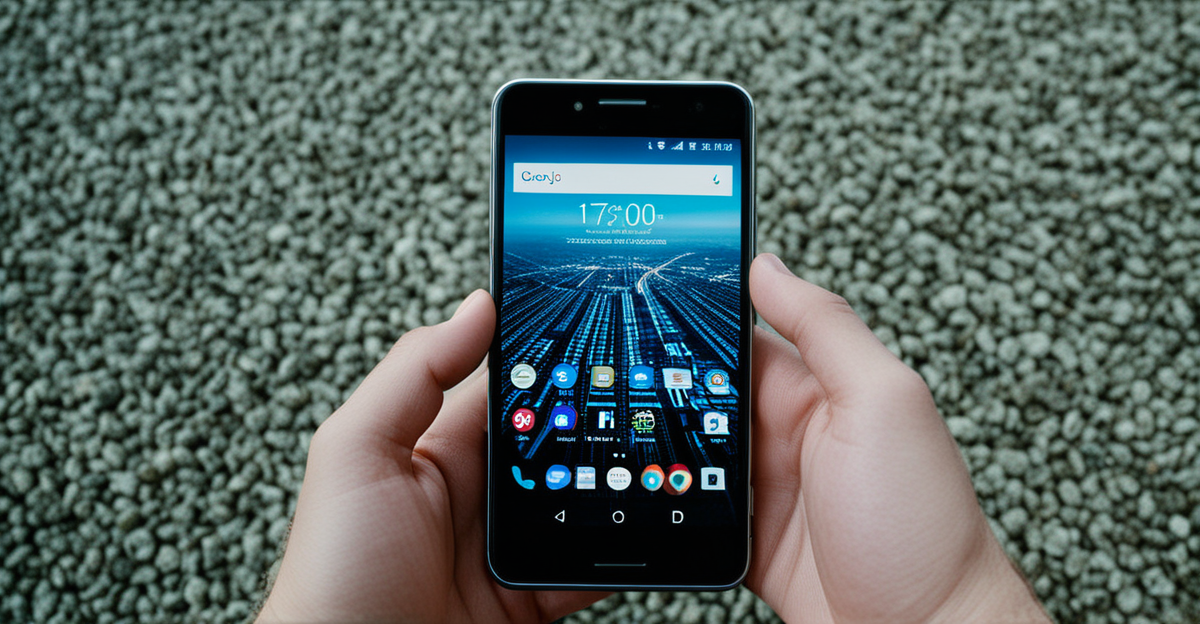The Rise of Smartphones in UK Computing
Smartphone adoption in the UK has seen a remarkable surge over recent years, profoundly transforming computing habits UK residents exhibit daily. Currently, the majority of UK users own a smartphone, with statistics showing continual growth in mobile internet usage UK wide. This widespread adoption signals a notable shift away from traditional desktop and laptop computing to a mobile-first computing approach.
As smartphones become the primary device for internet access, UK users increasingly rely on these devices for various digital activities, from browsing and social media to work-related tasks. This shift in device preference has altered daily digital behaviours and routines, with many people integrating mobile internet usage UK into their movements outside the home. For example, checking emails, streaming content, or making purchases on the go is now commonplace.
The rise of smartphones has also changed the landscape of web interaction in the UK, affecting website designs and service delivery to prioritize mobile compatibility. Consequently, this has encouraged more responsive and mobile-optimized digital experiences, aligning with the evolving computing habits UK. In essence, smartphones have not only expanded connectivity but reshaped how and when UK residents engage with digital content, reflecting an ongoing transformation in the broader IT ecosystem of the country.
Changing UK Internet Usage and Access Patterns
The shift toward mobile internet UK has fundamentally redefined how people in the UK access and consume online content. Data consistently shows an increasing preference for smartphones over traditional PCs when browsing the internet. Mobile devices now dominate as the primary tool for digital engagement, with usage patterns reflecting a clear move towards on-the-go internet consumption.
When comparing mobile versus PC usage, mobile browsing often surpasses desktop access during non-working hours, particularly in the evenings and on weekends. This trend highlights a change in digital habits change UK participants, with many users prioritizing convenience and instant access. It’s no longer unusual for people to use smartphones for activities once reserved for computers, such as banking, news reading, and streaming content.
Regional and demographic differences also shape these access patterns. Younger age groups and urban areas lead the surge in smartphone reliance, showing higher rates of mobile internet UK activity and contributing significantly to this digital transition. Conversely, some rural areas exhibit slower adoption rates, indicating ongoing variation within the population. This uneven pace points to a nuanced landscape where the rise of mobile-first web use varies by location and community, influencing the overall evolution of digital habits change UK.
Evolution of App Development and Mobile Services
Mobile technology’s rapid adoption has directly fueled the UK app economy and spurred substantial growth in mobile application development across the country. As mobile application growth UK accelerates, local developers are increasingly focusing on creating software that leverages smartphone capabilities, reflecting an industry-wide shift toward software trends prioritizing mobile-first experiences.
This evolution is evident in the proliferation of apps designed specifically for smaller screens and on-the-go usage. Developers optimize interfaces for touch controls, streamline navigation, and enhance performance to meet user expectations shaped by rising mobile internet usage UK. The emphasis on mobile-friendly design also aligns with computing habits UK adapting towards smartphones as central access points for everyday digital needs.
Additionally, demand is growing for personalized and context-aware services, such as location-based tools, real-time notifications, and seamless integration with other mobile functions like cameras and sensors. This shift shapes the UK app economy by encouraging innovation and increasing investment in mobile platforms. Consequently, the app ecosystem not only supports consumer needs but also drives business growth by opening new channels for engagement and service delivery.
In summary, the transformation in app development signals a broader change in the UK’s digital landscape—one that prioritizes mobility, accessibility, and user-centric design consistent with evolving computing habits UK and expanding mobile internet usage UK.
Impact on Remote Work and Productivity in the UK
The widespread smartphones adoption UK has significantly influenced mobile remote work UK, facilitating a flexible and dynamic approach to employment. Smartphones now function as essential productivity hubs, allowing UK workers to connect remotely with minimal barriers. This capability is crucial in maintaining continuity of work outside conventional settings, supporting hybrid models that blend office presence with remote flexibility.
Productivity tools mobile applications have seen substantial uptake in the UK, with platforms enabling communication, task management, and collaboration becoming integral to daily workflows. Popular apps facilitate video conferencing, instant messaging, and document sharing, ensuring teams remain connected regardless of location. This adaptation to mobile technologies has enhanced real-time cooperation and reduced downtime, enabling employees to respond promptly to work demands.
The shift to smartphone-enabled remote work has also impacted computing habits UK by blending personal and professional device use. While this integration increases accessibility, it also challenges users to manage boundaries between work and leisure effectively. However, the convenience of having work tools at one’s fingertips fosters a more flexible lifestyle. In response, businesses are increasingly investing in secure mobile platforms to protect data integrity while supporting this evolution in working patterns.
Smartphones Driving Digital Payments and E-commerce
The surge in mobile payments UK highlights how smartphones have revolutionized commerce by enabling convenient, secure transactions. Contactless payment technologies embedded in smartphones allow users to pay quickly in stores, while digital wallets UK have expanded options for online and mobile purchases. This seamless payment process stimulates greater use of mobile platforms for financial activities, directly aligning with increased mobile internet usage UK.
How are smartphones changing consumer buying habits? The answer lies in accessibility and speed. Mobile payment solutions reduce friction in checkout processes, encouraging spontaneous purchases and supporting the growing trend of mobile shopping trends. Consumers now often prefer browsing and buying directly from their phones, bypassing desktops altogether, which marks a pronounced shift in computing habits UK towards the mobile-first paradigm.
Moreover, this shift away from cash and traditional desktop shopping is supported by widespread smartphone adoption UK-wide, providing users with flexibility and enhanced security. The ease of storing cards and loyalty programs digitally reinforces changing digital habits change UK, where users expect integrated, user-friendly financial tools in their everyday mobile internet usage UK experience.
In summary, smartphones drive profound changes in digital payments by blending technology with consumer behaviour, making mobile commerce an essential component of modern UK retail and lifestyle.
The Rise of Smartphones in UK Computing
The smartphones adoption UK has reached unprecedented levels, with over 80% of the population owning a smartphone, reflecting a significant transformation in computing habits UK. This surge is driven by the rapid expansion of mobile internet usage UK, which has become the dominant mode for connecting to the web. Notably, this trend marks a clear shift from traditional computers to a mobile-first computing model, where the smartphone serves as the primary device for everyday digital activities.
This change reshapes daily routines across the UK. Activities such as browsing news, streaming media, and managing communications are now mostly conducted via mobile devices, even in contexts that historically favoured desktops or laptops. People increasingly engage with the internet while commuting, during breaks, or in social settings, indicating that mobile internet usage UK is altering when and where digital access occurs.
Moreover, this shift affects not only personal behaviour but also the broader ecosystem of digital service delivery. As users’ expectations evolve, websites and applications in the UK are being redesigned with a strong emphasis on mobile responsiveness and ease of use on smaller screens. Users’ computing habits UK thus influence industry-wide decisions to prioritize mobile-friendly platforms, ensuring seamless access to content regardless of device.
In sum, the UK’s growing embrace of smartphones has triggered a fundamental redefinition of computing. By putting portable connectivity at the forefront, the rise of smartphones in the UK illustrates an ongoing evolution towards flexible, on-the-go, and integral digital engagement through mobile internet usage UK.
Educational Shifts Enabled by Mobile Technology
Smartphones adoption UK has profoundly influenced education, driving a transition towards mobile learning UK that reshapes access and engagement. Schools increasingly integrate smartphones into classrooms and online setups, leveraging education technology to offer more flexible, interactive learning. This approach enhances connectivity, enabling students to access resources anytime, anywhere, which supports diverse learning styles and promotes inclusivity.
The growth of educational apps tailored to mobile platforms further fuels this trend. These tools deliver rich, personalised content and foster collaboration through interactive features such as quizzes, video lessons, and real-time feedback. As a result, mobile internet usage UK within educational contexts expands, encouraging continuous learning beyond traditional hours and venues.
This shift not only improves student engagement but also addresses logistical challenges, like recommending easily accessible materials for both in-class and remote learners. Smartphones empower educators to blend conventional teaching methods with digital innovations, creating dynamic environments that better align with the computing habits UK of younger generations accustomed to mobile connectivity.
The Rise of Smartphones in UK Computing
The smartphones adoption UK has witnessed remarkable growth, with over 80% of the population now owning a smartphone. This surge correlates directly with the increasing mobile internet usage UK, which has become the primary method for accessing the digital world. Traditional computing devices like desktops and laptops are steadily being replaced by a mobile-first computing paradigm, where smartphones fulfill the bulk of daily digital needs.
This transition from fixed to portable devices has profoundly influenced computing habits UK. Users now engage with digital content throughout their day—in transit, during breaks, or social gatherings—rather than confining internet use to stationary settings. Activities such as social media browsing, media streaming, communication, and even professional tasks have shifted remarkably onto smartphones. This change embodies a fundamental redefinition of how UK residents interact with technology, emphasizing flexibility and immediacy.
Moreover, the rise of smartphones is intricately linked to changes in digital behaviour and routines. The constant connectivity afforded by mobile internet encourages users to remain instantly accessible and engaged, merging online presence with daily life activities. This shift has also pressed service providers to prioritise mobile-friendly platforms, apps, and interfaces that cater specifically to the evolving computing habits UK shaped by widespread smartphone reliance.
In essence, the continuing expansion of smartphones adoption UK not only transforms device preferences but also reshapes the digital landscape of the UK. The dominance of mobile internet usage UK solidifies smartphones as indispensable tools, steering the country’s computing culture toward ever more portable and integrated experiences.











